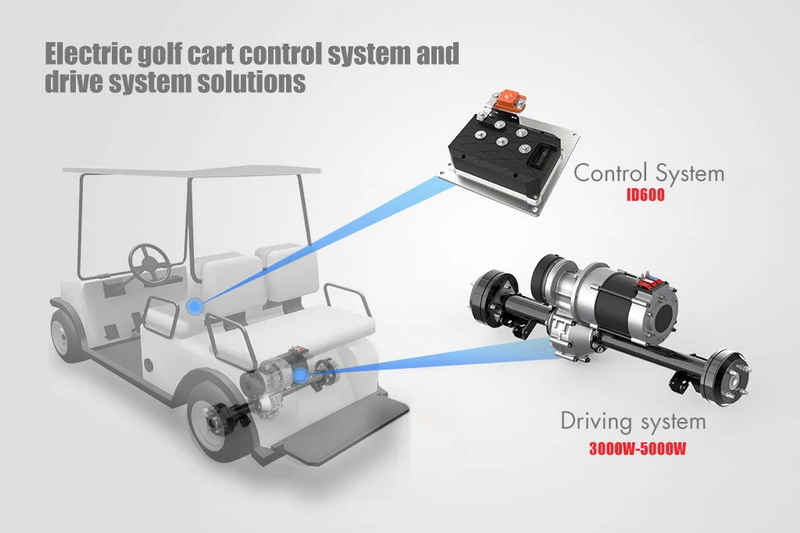Content Menu
● Key Components of Electric Golf Carts
● How Electric Golf Carts Operate
>> Power Supply
>> Electric Motor
>> Acceleration Control
>> Direction Control
>> Regenerative Braking
● Advantages of Electric Golf Carts
● Maintenance Considerations
● Conclusion
● FAQs
>> 1. What type of batteries do electric golf carts use?
>> 2. How long does it take to charge an electric golf cart?
>> 3. Can I use my electric golf cart on public roads?
>> 4. How far can an electric golf cart travel on a single charge?
>> 5. What maintenance do electric golf carts require?
Electric golf carts have become a popular choice for golfers and communities alike, providing a quiet, efficient, and eco-friendly mode of transportation. Understanding how these vehicles operate can enhance appreciation for their design and functionality. This article delves into the mechanics of electric golf carts, exploring their key components, how they work together, and the advantages they offer.

Key Components of Electric Golf Carts
Electric golf carts consist of several essential components that work in harmony to provide reliable transportation. The main parts include:
- Electric Motor: The heart of the golf cart, converting electrical energy from the batteries into mechanical energy to drive the wheels.
- Battery Pack: Stores electrical energy, typically composed of lead-acid or lithium-ion batteries.
- Controller: Acts as the brain of the system, regulating power flow from the batteries to the motor based on user input.
- Charger: Replenishes the battery's energy when it runs low.
- Drive Train: Transfers power from the motor to the wheels, enabling movement.
How Electric Golf Carts Operate
Power Supply
The operation begins when the golf cart is powered on. The battery pack supplies electrical energy to the electric motor. Modern electric golf carts primarily use lithium-ion batteries due to their efficiency and longevity, although traditional lead-acid batteries are still common in older models.
Electric Motor
Once powered, the electric motor converts electrical energy into mechanical energy. This process involves electromagnetic principles where current flowing through coils generates a magnetic field that interacts with permanent magnets inside the motor. This interaction causes the rotor to spin, which is directly connected to the wheels of the cart.
Acceleration Control
The speed of an electric golf cart is controlled through an accelerator pedal. When pressed, it sends a signal to the controller, which adjusts the amount of electricity flowing to the motor. More electricity means higher speeds, while releasing the pedal reduces power and slows down the cart.

Direction Control
To change direction, users can shift a gear selector or flip a switch that reverses the polarity of the current flowing to the motor. This simple mechanism allows for smooth transitions between forward and reverse motion.
Regenerative Braking
One of the innovative features of modern electric golf carts is regenerative braking. When brakes are applied, instead of wasting kinetic energy as heat (like in traditional braking systems), the electric motor acts as a generator. It converts some of that kinetic energy back into electrical energy, which is then sent back to recharge the battery pack. This system not only enhances efficiency but also extends battery life by reducing reliance on external charging.
Advantages of Electric Golf Carts
Electric golf carts offer numerous benefits compared to their gas-powered counterparts:
- Environmental Benefits: They produce no emissions during operation, making them an eco-friendly choice for golf courses and residential areas.
- Cost Efficiency: Operating costs are significantly lower since electricity is cheaper than gasoline, and electric carts require less maintenance due to fewer moving parts.
- Quiet Operation: The silent operation enhances the golfing experience by maintaining tranquility on courses and minimizing noise pollution in residential areas.
- Ease of Use: With simple controls and smooth acceleration, electric golf carts are user-friendly for all ages.
Maintenance Considerations
To ensure optimal performance and longevity of electric golf carts, regular maintenance is crucial:
- Check battery levels regularly (especially for lead-acid types) and clean terminals to prevent corrosion.
- Inspect tires for proper inflation and wear.
- Ensure brakes are functioning correctly and check regenerative systems if equipped.
- Keep motors and controllers clean from debris to avoid overheating or malfunctioning.
Conclusion
Electric golf carts represent a significant advancement in personal transportation on golf courses and within communities. Their combination of efficiency, environmental friendliness, and ease of use makes them an attractive option for many users. As technology continues to evolve, we can expect further improvements in performance and sustainability in electric golf cart designs.

FAQs
1. What type of batteries do electric golf carts use?
Electric golf carts typically use either lead-acid or lithium-ion batteries. Lead-acid batteries are more affordable but have shorter lifespans compared to lithium-ion batteries, which offer better performance and longevity.
2. How long does it take to charge an electric golf cart?
Charging times can vary based on battery type and charger capacity but generally range from 4 to 8 hours for a full charge.
3. Can I use my electric golf cart on public roads?
Many areas allow electric golf carts on public roads if they meet specific safety requirements such as lights and seat belts; however, regulations vary by location.
4. How far can an electric golf cart travel on a single charge?
The distance an electric golf cart can travel on a single charge depends on factors like battery size and terrain but typically ranges from 20 to 40 miles.
5. What maintenance do electric golf carts require?
Regular maintenance includes checking battery health, inspecting tires, ensuring brakes function properly, and keeping electrical components clean from debris.



















































